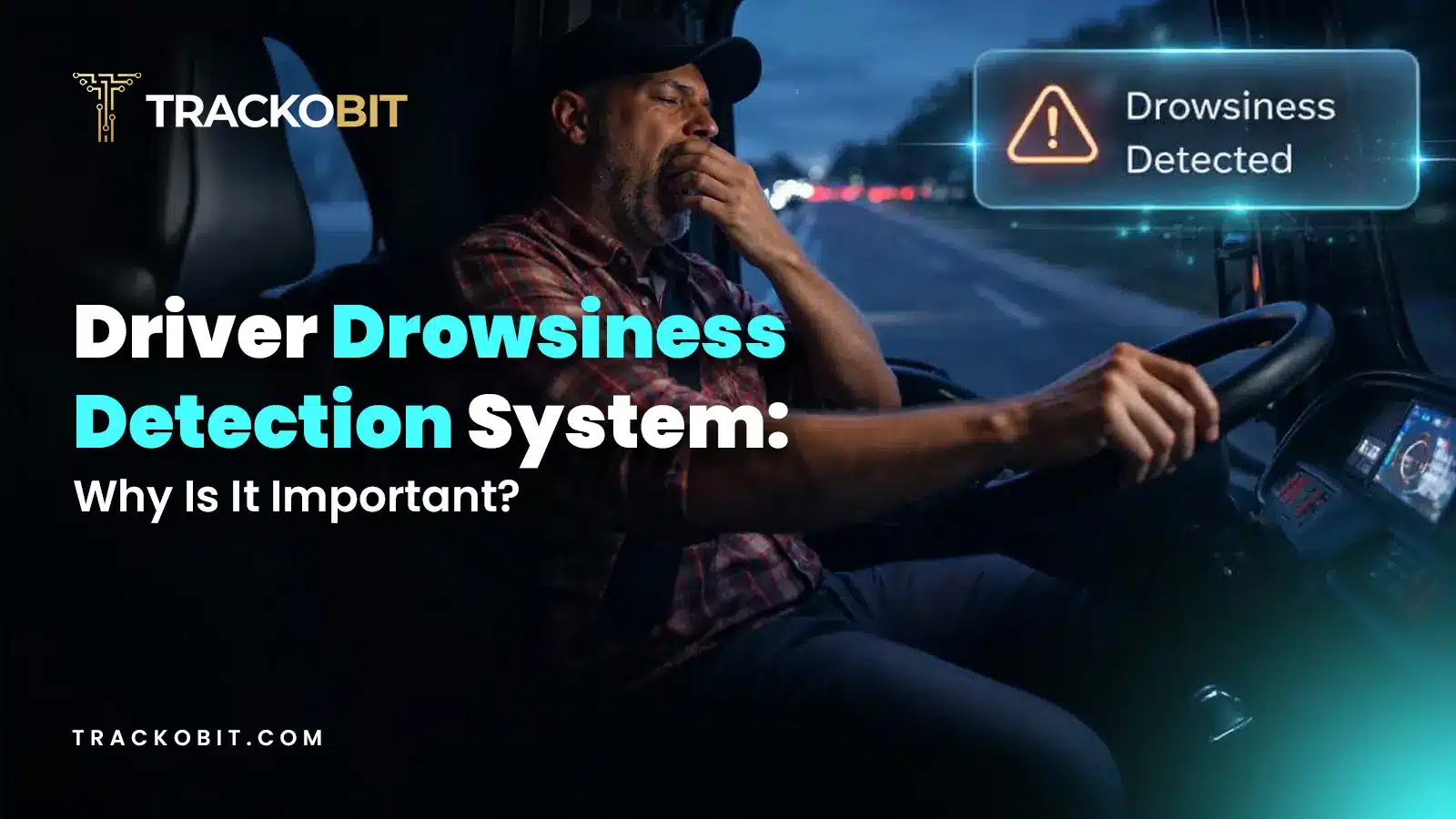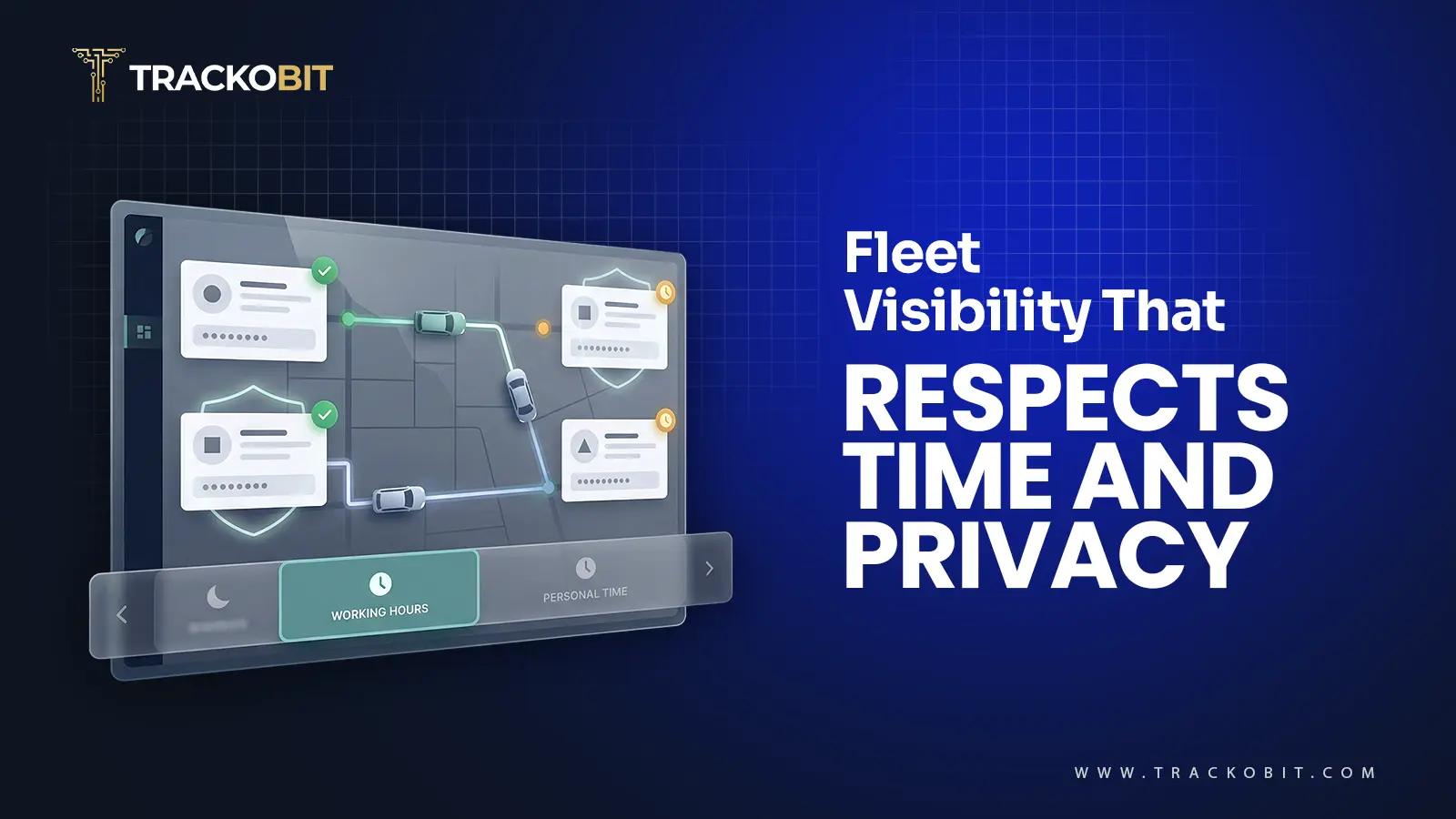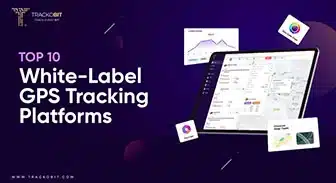-
TrackoBit
Manage commercial vehicles with the new-age Fleet Management Software
TrackoBit -
TrackoField
Streamline your scattered workforce with Field Force Management Software
TrackoField -
Features Resources
-
Blog
Carefully curated articles to update you on industrial trends. -
White Paper
Insightful papers and analysis on essential subject matters. -
Glossary
Explore an alphabetical list of relevant industry terms. -
What’s New
Get TrackoBit & TrackoField monthly updates here. -
Case Study
Explore the cases we solved with our diverse solutions. -
Comparisons
Compare platforms, features, and pricing to find your best fit.
-
About Us
Get to know TrackoBit: our team, ethos, values, and vision. -
Careers
Join the most dynamic cult of coders, creatives and changemakers. -
Tech Support
Learn about our technical support team and services in detail. -
Events
Check out the exhibitions where we left our marks and conquered. -
Contact Us
Connect with us and let us know how we can be of service.
What Is An OBD GPS Tracker And How Can You Use It?
- Author:Ayushi Nagalia
- Read Time:7 min
- Published:
- Last Update: February 3, 2025
Table of Contents
Toggle
OBD GPS Trackers are revolutionary plug-and-play devices that fit right into your vehicle’s OBD-II port to collect all possible data about what is happening under the hood!
Table of Contents
Toggle
It’s the perfect marriage of good hardware and reliable software that does wonders for fleet operators and owners.
OBD devices check all the right boxes for fleet management software to pick them as their right match but… conditions apply! (keep reading to know more)
They bridge the gap between the GPS tracking software and your vehicle’s On-Board Diagnostics system. With a plethora of functionalities and benefits to offer, OBD GPS trackers can essentially revolutionise the way you interact with your vehicles.
So, fasten your seatbelts, and let’s zoom into the world of OBD GPS trackers in this blog!
What is an OBD GPS Tracker?
OBD GPS Trackers are 16-pin plug-and-play devices that merge the power of GPS technology with your vehicle’s On-Board Diagnostics system. They are built to collect data from within your vehicle’s electrical system and share it with the fleet management software.
That’s the essence of an OBD GPS tracker. But let’s break it down further:
- Data at your fingertips: Plugging in an OBD fleet tracker is like having a direct line into your vehicle’s vitals. OBD GPS trackers provide real-time access to crucial data such as vehicle performance, fuel levels and other vitals that are accessible by the hardware.
- Seamless integration: Unlike wired GPS trackers, OBD trackers effortlessly connect to your vehicle’s OBD-II port. Moreover, you can transmit and collect the data in any fleet management software of your choosing.
- Fleet management made smarter: With comprehensive insights into your fleet’s performance and health, OBD GPS trackers help you enhance fleet efficiency by monitoring fuel levels, optimising trip planning and automating fleet operations.
How Does an OBD Tracker Work?
Just plugging a device into your vehicle and getting untampered data about its inner workings is fascinating. But how these OBD trackers work is even more fascinating. Let us look at the process here:
- Plug and Play: Easy installation is every OBD tracker’s forte. They are designed in such a way that you can simply locate your vehicle’s OBD-II port (usually underneath the dashboard) and plug in the 16-pin device. No complex wiring, no wear and tear and no technical expertise required.
- The Power of CAN bus: The OBD tracker communicates with your vehicle’s On-board Diagnostics system using the Controller Area Network (CAN bus) protocol. The advanced OBD GPS trackers interpret the strings received in the CAN bus protocol and decode them for software to present in bite-side reports.
- Comprehensive Data Collection: Once connected, the OBD tracker begins collecting all the information the respective OEM will allow it to – which may not include everything. The commonly included vitals are performance metrics, mileage, fuel levels, etc.
- OEM Data Compatibility: The best OBD trackers tap into Original Equipment Manufacturer (OEM) data to decipher encoded strings. Thereby, it can decode all the electrical codes and RAW data it collects from the vehicle into understandable insights for you. This access to OEM data sets them apart from generic GPS trackers.
- Transferring Data: No matter what fleet management system you choose, the OBD tracker will send information to it. This seamless integration allows you to access the information remotely and in real time.
Use Case for OBD Trackers
OBD trackers can offer you an array of possibilities to optimise your fleet’s operations, enhance driver safety, and reduce costs.
They provide you with real-time data and insights with which you can make informed decisions that drive your businesses forward. In this section, let us look into the various ways in which an OBD port GPS tracker can enhance fleet functions.
Fleet Monitoring and Maintenance
Since these wireless 16-pin trackers are in direct contact with vehicles’ OBD system, fetching operational data, vehicular insights and performance analytics becomes easier given the hardware is potent enough to decode it all. This capability of OBD trackers coupled with the software automation gives unimaginable power to fleet owners.
This also allows for proactive maintenance scheduling, ensuring that vehicles are serviced at the right time to prevent breakdowns and costly repairs.
Fuel Efficiency and Cost Reduction
The biggest use case we’ve been seeing for OBD trackers is tracking fuel levels in a vehicle without needing any external equipment.
These trackers provide valuable data on fuel consumption, allowing you to identify inefficient driving habits, such as excessive idling or aggressive acceleration. This data also helps you understand if your fleet is running on inefficient routes or if the engine is not working to the best of its capabilities.
Driver Behavior Monitoring
OBD trackers enable fleet managers to track and analyse driver behaviour, including speeding, harsh braking, and rapid acceleration.
This data can be used to provide feedback and coaching to drivers, promoting safer and more responsible driving habits, ultimately reducing the risk of accidents and improving overall fleet safety.
The Advantages of OBD GPS Trackers
OBD GPS trackers are not just tracking gadgets; they are powerful tools that can transform your fleet operations. By leveraging their benefits, you can achieve greater control, efficiency, and cost savings for your fleet. Let’s explore some key benefits that make OBD GPS trackers indispensable tools for fleet managers and owners:
- Easy, Untampered Supervision: The best thing about OBD fleet trackers is that they offer you untampered data right from the vehicle’s control unit. Moreover, you do not even have to fiddle with inner wiring and tech. You get all the information you need – completely untouched, without having to play with your vehicles’ insides.
- Real-time Monitoring: OBD GPS trackers provide real-time access to essential vehicle data, giving you instant insights into your fleet’s performance, trip status and overall operations. This allows you to make informed decisions on the go, improving efficiency and responsiveness.
- Enhanced Efficiency and Productivity: With comprehensive insights into your fleet’s performance, you can optimise routes and improve fuel efficiency. By identifying inefficiencies and addressing them promptly you boost productivity and reduce operational costs.
- Improved Maintenance and Preventive Care: OBD GPS trackers enable proactive maintenance scheduling based on real-time vehicle diagnostics. By staying ahead of potential issues, you can prevent breakdowns, minimise downtime, and reduce repair costs.
- Fuel Cost Savings: OBD trackers provide accurate data on fuel consumption, enabling you to identify fuel-wasting behaviours. By addressing these issues and optimising routes, you can significantly reduce fuel costs and increase profitability.
- Insurance Benefits: Once you install OBD GPS trackers into your vehicles, you’ll see several insurance companies offering you discounts and competitive premiums. This is mostly because the providers can see that your fleet is already equipped with safety and maintenance measures.
The Disadvantage of OBD GPS Tracker
Yes, OBD trackers seem to be the next best thing that could’ve happened to your fleet since you adopted fleet management software. But that doesn’t mean everything is rainbows and unicorns. Let us look at some challenges here:
- Dependency on Vehicle Compatibility: While rare, some older models of vehicles might not have an OBD-II port. Since these trackers are completely dependent on a 16-pin OBD-II socket, in such cases, the device will be rendered useless.
- Limited Data Transmission: OBD trackers transmit data through cellular networks. Therefore, in areas with poor network coverage, data updates may be delayed or interrupted.
- Need for OEM data: While OBD trackers capture all available data from the vehicle’s OBD system, it’s not enough if the information is gibberish. If an OBD tracker doesn’t have robust firmware to decode strings, it’s a waste, as the data it collects will be encoded.
- Battery Drain: All electronic devices installed in your vehicles consume battery. If an OBD tracker is not designed well, it can drain your vehicle’s battery significantly, ultimately influencing performance.
How to Know the Quality of OBD GPS Tracker
There are a lot of OBD trackers in the market, especially after fleet managers have realised the importance of data in effective fleet management. But it goes without saying, when there are a lot of products, there’ll be several bad ones too.
So, before buying an OBD tracker for your fleet, check the device for the following quality checks:
- Built: Make sure that the OBD fleet tracker is made of good quality materials. Also, the wiring inside is such, it doesn’t consume too much battery from the vehicle. The device should be able to run on sleep mode and be programmed to run on a minimum battery.
- Compatibility: The OBD tracker should be compatible with the exact model and make of your vehicles. Otherwise, you will either not be able to retrieve data or will find the device interfering with your vehicle’s internal electronics.
- OEM Data: You can get any OBD tracker at a low price and be enticed to get it. But the catch is – the device will only collect the raw data and will leave the responsibility to decode it to you. Only the best OBD devices will have OEM decoding scripts to give you understandable readings for metrics like mileage, battery consumption, and fuel levels. Choose wisely.
Pair the Best OBD Tracker with the Best Fleet Management Software
If you already have good OBD trackers installed in your vehicles, you’re ready to optimise operations, right? But wait! You’ll need a fleet management software to access and strategise on the collected data, and your best call is TrackoBit.
TrackoBit will take all this OBD data and present it in bite-sized actionable reports. It will also help you optimise your fleet strategy with powerful tools like route optimisation and DMS ADAS.
So, what are you waiting for?
Ayushi Nagalia is a Senior Content Specialist at TrackoBit. She is a marketing maverick with a lush background in literature. With years of experience crafting content for various niches, she speciali... Read More
Related Blogs
-

5 Best Driver Behavior Monitoring Systems for 2026
Tithi Agarwal February 23, 2026Having the best driver behavior monitoring system is a necessity as it helps you ensure driver safety and optimize operational…
-

Why is Driver Drowsiness Detection System Important for Fleet Management?
Shemanti Ghosh February 4, 2026A driver drowsiness detection system is critical for fleet management. It helps prevent fatigue-related accidents and reduces operational risks through…
-

When Tracking Needs a Clock: Rethinking Fleet Visibility
Tithi Agarwal December 24, 2025Read on to understand why fleet tracking works better when it follows working hours. Because visibility should support operations, not…
-

What Makes TrackoBit’s Video Telematics Software Truly Next-Gen?
Shemanti Ghosh December 17, 2025TrackoBit’s video telematics software blends smart video intelligence with full server control. The result? Superior fleet reliability and safety.

Subscribe for weekly tips to optimize your fleet’s potential!
Your inbox awaits a welcome email. Stay tuned for the latest blog updates & expert insights.
"While you're here, dive into some more reads or grab quick bites from our social platforms!"Stay Updated on tech, telematics and mobility. Don't miss out on the latest in the industry.
We use cookies to enhance and personalize your browsing experience. By continuing to use our website, you agree to our Privacy Policy.




































